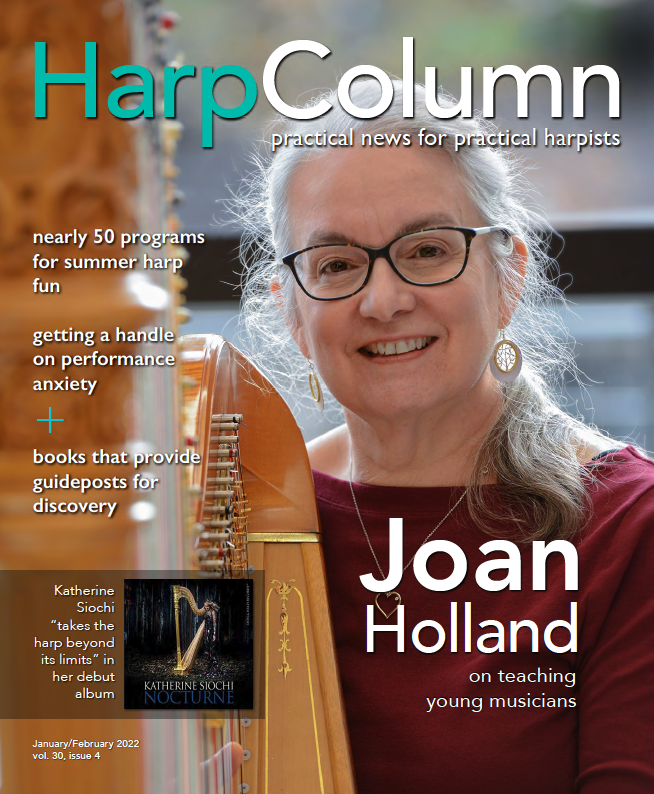As a harpist, how much time do you spend by yourself? Tally up the time spent practicing, commuting to lessons or gigs, performing, studying scores, and maintaining your instrument, and your answer probably lands somewhere between “a lot of time” and “all of it.”
Being a musician dedicated to your craft means many hours practicing in solitude. Being a harpist can feel even more isolating. We perform solo more than in a group, and when we play with a band or orchestra, we sit in a section of one. But being with others and collaborating with colleagues is a crucial part of our musical development. If nearly two years of social distancing have taught us anything, it is how vitally important being with others is to our mental health and overall well-being.
So what’s a lonely harpist to do? We have two great ideas for you in this issue.
Great Idea #1: Go to camp.
There is no better way to develop musical friendships in a short period of time than at camp. This is true for all musicians, but especially for harpists. Without section mates or stand partners, we have fewer chances to connect with other musicians than the typical string or wind player. Summer camp gives us the rare opportunity to be not just with other musicians, but with other harpists.
Summer camp is a place where we can find our people and fit in. This is often a new feeling for harpists.
Time and time again I’ve seen young musicians thrive at summer camp. It’s not just the rapid technical and musical improvements students make—it’s the social and emotional growth that happens at the same time. Last summer, my normally quiet and reserved teenage son came home from two weeks away at music camp with an air of confidence I had never seen before. He was buzzing about his camp experience, animated and excited to share every detail…very uncharacteristic for my son…or pretty much any teenage boy. I asked him why he liked this camp so much, and he said, “All the people—they’re all so fun, and I am actually ‘cool’ there.” Summer camp is a place where we can find our people and fit in. That is often a new feeling for harpists.
This is all well and good, but you may be thinking, “I’m an adult; I’m too old for camp.” Au contraire. As you will see in the nearly 50 camps listing in our annual “Summer Harp Camp Roundup” on pg. 30, camp isn’t just for kids. There are plenty of offerings for young professionals and adult amateurs, and most don’t require living in a cabin and obeying curfew like the kids’ camps. I’ve seen how transformative the camp experience can be for adult students too—you don’t have to be 12 years old to thrive and grow at music camp.
Great Idea #2: Join a harp salon.
If you’re an adult, you may still be skeptical that camp is for you. That’s fine. Our second idea for spending quality time other harpists is to join a harp salon. A what? Well, this will make more sense after you read Karen Jougla Shelton’s “Sounding Board” article on pg. 10. Jougla Shelton was frustrated by the isolation of her harp life. As an adult student, the only other harpists she saw were her teacher and the occasional student she would pass coming or going to her lesson. “I found myself wishing for a local community that would share my passion for the harp,” she writes. So Jougla Shelton decided to do something about it. She started what she coined a “Saturday Salon”—a bi-monthly gathering of adult harp students who play for each other. “Our intentions are simply to get out of our bubble, share our music, and support each other,” she notes. More than seven years after it began, the “Saturday Salon” is still going strong, a testament to the connection and support harpists find there.
So whether it’s a salon, summer camp, or somewhere in between, go find some harpists and spend time with them. They’re your kind of people. •
Talk to us
Do you know a harpist who you think others should hear about? Do you have a unique perspective you want to share? We want to hear from you. Email your ideas to areese@harpcolumn.com.







